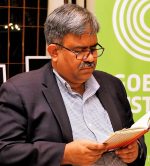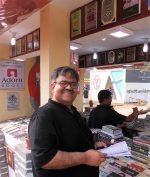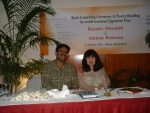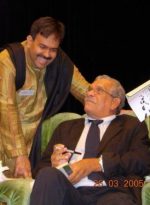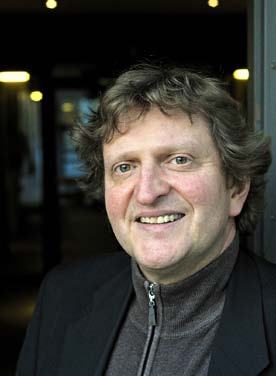Tobias Burghardt flaniert jeweils am 5. eines Monats auf DAS GEDICHT blog durch die südlichen Gefilde der Weltpoesie. In der Rubrik »Im babylonischen Süden der Lyrik« werden Sprachgemarkungen überschritten und aktuelle Räume der poetischen Peripherien, die innovative Mittelpunkte bilden, vorgestellt.
Bangla poet Aminur Rahman , born 1966 in Dhaka, is considered to be one of the widely known poets in abroad from Bangladesh. In February 2017, we met each other and launched his new poetry book at the »Amar Ekushey Grantha Mela«, the International Bangladesh Book Fair, at Dhaka International Poets Summit, and also at the Goethe-Institute Dhaka. Together we strolled his tropical city, drinking green coconut water, eating lovely deshi fish dishes. Now, we’re going on, just talking about Bangla poetry.
Bangladesh is currently an emerging country in South Asia. Which are the cultural strengths of your young country?
Yes, Bangladesh is one of the emerging countries in Asia including economy and other aspects is concern. Our economy is growing anually approx 6 % in the last few years. We have thousand years of cultural history. Bangla literature has also a thousand years old tradition. Before 1947, it was belonging to the Indian subcontinent. Nobel Laureate Rabindranath Tagore had spent creative 10 years in Bangladesh, still his three houses in three different places in Bangladesh are present, where he has written, for example, his famous poems »River Padma« and »Golden Boat«.
You’re writing poetry in your mother language Bangla. Which Bangla poets are your favourites or most influential for your poems?
Yes, I‘m writing mainly in Bangla, but also in English. I have a lot of favourite Bangla poets in my list. But my most favourites are Jibanananda Das and Sudhindranath Dutta . I don’t think any influence is there, but I like their poetry!
What are the special topics in your poetry?
I always would like to write love poems. I want to write more love poems!
You studied also music (guitar and composition). What do you think about music & poetry?
Yes, I had completed 5 years diploma course on Hawaiian guitar in my childhood. There is a strong bondage between music and poetry. Every poetry has inner music.
What was your experience at the International Poetry Festival of Medellín 2002, and later on with other poetry festivals of the world?
Wonderful.
https://www.youtube.com/watch?v=I349VNJ8rQk
Medellín is one of the best festivals in the world. I have attended two times Granada International Poetry Festival, Nicaragua. It‘s also a highly reputed poetry festival in the world. I had attended a few other World Poetry Festivals, organized by the World Congress of Poets; the Mongolian was the best one. Taiwan Poetry Festival, organized by Dr Lee Kuei-Shien , is also very good. Babylon Festival for International Cultures & Arts in Iraq, organized by Dr Ali Al-Shalah , is a nice and different one. Numera World Poetry Festival in Malaysia was another amazing experience.
Which are the poetry initiatives of your megalopolis Dhaka with around 20 million citizens and other regions of Bangladesh in the last decades until today?
In Bangladesh, there are few poetry festivals which take place. Jatiya Kabita Utshab is the older one. In the last three years, Kathak organizes the newest one, called Dhaka International Poets Summit.
You like the cuisine and good fish such as Hilsha or other Bengal Delta river fishes? What’s your best of deshi dishes?
Hilsha fish from the river Padma is a delicacy. Fried Hilsha and Mustard Hilsha are the most famous. Bangladeshi people like sweet water fishes. We have a lot of small fishes, too. I like some of them.
A short time ago, the great Caribbean Nobel laureated poet Derek Walcott died at his home in St.Lucia. Do you have met him once?
Yes, I met him in 2005 in Kaouhsiung, Taiwan, at the World Poetry Festival. I was with him for a few hours. We had discussed some issues. One was translation. When I was asking him, whether he knows our literature, he said NO. Derek Walcott also said to me, he did not get any good translation from this part of the world. He also mentioned, that it is, in any case, very important.
Following the inspiring idea of Derek Walcott as a poetical bequest to read mostly unattainable Bangla poetry of Bangladesh, in this springtime came out in Germany the bilingual poetry book by Aminur Rahman: »Perpetual diary – Fortwährendes Tagebuch« (Edition Delta, Stuttgart 2017), translated into English mainly by the Indian English poet Sudeep Sen, among others, and into German by the Vienna poet Manfred Chobot. So everybody can have the lucky chance to know fresh Bangla poetry.
 »PERPETUAL DIARY – FORTWÄHRENDES TAGEBUCH« bei Edition Delta kaufen
»PERPETUAL DIARY – FORTWÄHRENDES TAGEBUCH« bei Edition Delta kaufen
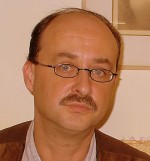
Tobias Burghardt (Jahrgang 1961) ist Lyriker, Übersetzer und Verleger der Stuttgarter Edition Delta (www.edition-delta.de). Er veröffentlichte mehrere Lyrikbände, darunter seine Fluss-Trilogie und zuletzt »Septembererde & August-Alphabet« (2010). Seine Gedichte wurden in zahlreiche Sprachen übersetzt und Einzeltitel erschienen in Argentinien, im Irak, in Japan, Portugal, Serbien, Schweden und Venezuela. Er ist Mitbegründer und Koordinator des »Babylon Festivals für Internationale Kulturen & Künste«, das seit 2012 jährlich in Babylon und Bagdad stattfindet. Mit seiner Frau Juana Burghardt überträgt er lateinamerikanische Lyrik, katalanische Poesie, lusophone Lyrik und spanische Poesie. Sie sind Herausgeber und Übersetzer der Werkreihe von Miquel Martí i Pol, aus der Pep Guardiola im Sommer 2015 im Literaturhaus München las, und seit Herbst 2014 der Stuttgarter Juarroz-Werkausgabe, dem wir das GEDICHT-Motto »Ein Gedicht rettet einen Tag« (Roberto Juarroz) verdanken. Im Frühjahr 2017 wurden beide für ihr jeweiliges poetisches Werk und ihr gemeinsames literarisches Engagement zwischen den Kulturen und Sprachen mit dem Internationalen KATHAK-Literaturpreis in der südasiatischen Metropole Dhaka, Bangladesch, ausgezeichnet. Tobias Burghardt war GEDICHT-Redakteur der ersten Stunde und organisierte immer wieder wunderbare Sonderteile mit lateinamerikanischer Poesie für unsere Zeitschrift DAS GEDICHT.
Alle bereits erschienenen Folgen von »Im babylonischen Süden der Lyrik« finden Sie hier.



